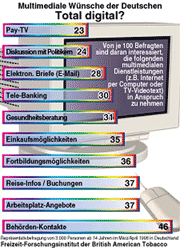Totally digital, totally normal?
How we want to live in the future age of communication
Public fear of a fully networked world is declining. At the same time, interest in tomorrow's information and communication technologies is growing. Nearly half of all Germans (46%) would like to replace visits to government offices with online services in the future. A good third of the population would like to access current job postings via their computers (37%). And almost one in four Germans (24%) would like to participate in discussions with politicians online from home. These findings come from a recent representative survey conducted by the Leisure Research Institute of British American Tobacco, in which 3,000 people aged 14 and over were asked about their multimedia interests.
""A new age of communication is beginning," says institute director Prof. Dr. Horst W. Opaschowski. "Telecommunications can change our entire everyday lives." Multimedia and the internet will play an increasingly important role in both private and professional life.
New teleservices from banks and government agencies
The use of multimedia in public administration could significantly improve the relationship between authorities and citizens in the future: fewer waiting times, hardly any queues, and no more limited opening hours – one reason why working people (57%) are particularly interested in government teleservices. The public's multimedia visions for the future seem almost limitless: Will there be virtual local associations, online constituencies, or even electronic voting in future elections? Will politicians have to engage in electronic discussions? Those with higher education are particularly interested in these unconventional political dialogues – almost half of all university and college graduates (46%), compared to only 15 percent of respondents with a lower secondary school leaving certificate.
The use of a communication network such as the Internet via computer or teletext via television offers access to new types of services: Tele-shopping, tele-banking and tele-learning will no longer be utopias in the future, even if they are still more wishful thinking than reality today.
Only three percent of German citizens currently regularly use online shopping. However, a third of the population (33%) would like to obtain information about products or services directly on their television or computer screen and potentially purchase and use them. In particular, population groups with significant family and professional commitments hope that electronic shopping services will save them some personal time. Professor Opaschowski explains: "However, online shopping will not compete with traditional shopping trips in the future. Electronic ordering and shopping services complement, but do not replace, the experience of browsing in shopping centers. People still want to consume using all their senses.""
More quality of life through improved service quality
Consumers expect telecommunications to make their lives more convenient, for example, by allowing them to book travel online from home. 37 percent of those surveyed expressed interest in this. Nevertheless, travel agencies will still have plenty to do. The more direct bookings are made online in the future, the more additional services (such as airport transfers, house-sitting, pet care, reservations, and tickets for special events, happenings, or attractions) can be added to the range of services offered by travel agencies.
The content and quality of services are changing. Even though, for example, telephone banking is an alternative for one in three consumers (30%), special service concepts will still be necessary in the future to maintain direct and personal contact with customers. Banks as advisory centers may become even more important with the spread of direct and home banking.
Email as a secret revolution?
On the impossibility of missing out
The postcard era is coming to an end. Fewer and fewer letters are still handwritten. Emails, electronic letters, are revolutionizing everyday communication – just like the telephone and fax machine. The omnipresence of the new medium of email is ushering in a new age of communication: everyone can communicate with everyone else, anywhere, anytime. Six percent of the population already regularly sends and receives emails. Young people aged 18 to 24 (131%) are particularly enthusiastic about writing electronic letters. Four times as many (511%) would like to actively participate in this new communication system. The constant availability, combined with the certainty of never missing a message, holds a special appeal for the younger generation. Opaschowski: "Life with the big 'E' brings speed, fun, and mobility. This perfectly reflects the lifestyle of today's young generation.""
Pay extra for sports broadcasts?
""No thanks!
The free broadcast of sporting events on television is considered by most Germans to be almost a fundamental right that must not be infringed upon. And any consideration of charging extra fees for exclusive events (for example, live Bundesliga matches, the World Cup) meets with strong resistance from most viewers. Only 23 percent of the population expresses interest in exclusive TV programs on pay television. Almost three-quarters (711%) reject such an offer. This is especially true for the population in eastern Germany (801%) – compared to 691% in western Germany.
The "Brave New Media World" of tomorrow can certainly make life more pleasant and enriching, but it can also lead to additional time and financial burdens. Opaschowski: "The sheer variety of options will leave many people short on time and money. The constant questions of 'What first?' or 'How much of what?' leave people increasingly preoccupied. Internet users can quickly fall into the time trap of the information society. Perhaps what the American pioneer of new communication technologies, Nicholas Negroponte, predicted in 1995 is more accurate for the multimedia future: People's multimedia dreams 'may come true, or they may not...' Technological progress alone is not enough. The new age of communication can only become a reality when people are also willing to change themselves and their cherished old habits.""



